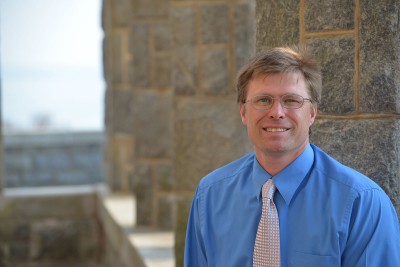Jeffrey Labasi had spent more than 20 years leading a lucrative career as a research scientist in pharmaceuticals – an industry where, Labasi admits, he was never really happy.
A father of three, Labasi instead found fulfillment outside of working hours, filling his free time with activities at his children’s schools – organizing invention conventions for students, serving as PTO president for a time, and coaching a number of different sports, season after season.

In his 40’s, Labasi began seriously considering a profession that would allow him to focus on working with kids. “I realized I had a kind of calling,” he says.
Thanks to an accelerated teacher education program for nontraditional students based at UConn’s Avery Point campus, Labasi, now 45 years old, is embarking this fall on a second career as a science teacher.
A Focus on STEM
The Teacher Certification Program for College Graduates (TCPCG) at Avery Point is a post-baccalaureate program designed for people like Labasi, who have previously earned degrees in the field of STEM – science, technology, math, and engineering – and preparing them to become math- or science-certified teachers in less than one year. Students enrolled in this STEM-specific program, offered through UConn’s Neag School of Education, earn a master’s degree in curriculum and instruction, as well as recommendation for teacher certification by the state of Connecticut.
The 11-month program involves intensive coursework, as well as direct teaching experience with children in nearby New London and Norwich schools; a three-month student teaching assignment; and an internship that immerses enrollees in research examining some aspect of school innovation or reform.
A new grant will provide $30,000 to sponsor 24 individual future science teachers at UConn’s Avery Point campus over the next four years.
For Labasi, who completed the program this May and will be certified to teach biology and chemistry in Grades 7 through 12, two aspects of the Avery Point program were particularly powerful. “Learning with other science- and math-minded people was important to my growth,” he says. In addition, his stint as a student teacher in Waterford solidified his decision to change careers for good. “When I left student teaching, it was actually really hard; I was sad,” he says. “That feeling of being upset at leaving reinforced that I really enjoy doing this.”
In Search of Future Science Teachers
Teachers specializing in science and math are in high demand across the state of Connecticut, which makes the TCPCG program’s STEM focus at the Avery Point campus crucial, according to John Settlage, professor of science teacher education in the Neag School and director of Avery Point’s STEM teacher preparation program.
In fact, all 11 graduates from the program’s first cohort, who graduated in May 2014, had received job offers by the following July 1, within weeks of completing the program. As Labasi now looks to land a permanent position, he says he hopes that potential employers will see his firsthand experience in the field as a unique strength. “I have a real science perspective that I think will help me in making connections within the classroom,” he says.

Given Connecticut’s need for STEM-focused teachers, individuals with an extensive level of experience in the field are the bread and butter of the Avery Point program.
“Here, we can take advantage of people who want to change careers,” Settlage says, adding that Avery Point is the only teacher preparation program in the region. Career changers from the STEM fields who pursue the program, he says, know what they want; they possess not only a love for science and mathematics, but also a certain level of maturity and knowledge. “I can’t fool them,” Settlage says. “I can’t give them a course and tell them it’s what they need. They don’t play that game. They’re consumers; they ask hard questions. And we need more of them.”
Scholarship Support for Minority Teachers
Settlage is now actively recruiting aspiring science teachers from nontraditional backgrounds through a grant funded by the National Science Foundation. The grant will provide $30,000 – the Robert Noyce Teacher Scholarship – to sponsor 24 individual future science teachers at UConn’s Avery Point campus over the next four years.
“I think one of the reasons we have big achievement gaps in Connecticut is because kids aren’t seeing teachers who look like them,” Settlage says. “So we are trying to recruit the kinds of teachers kids would recognize. I realize now that when I was growing up I had all kinds of role models, but if I had been a kid of color, I wouldn’t have seen that, so I may not have even thought about this [as a career option].”
Settlage anticipates that the Noyce Scholarship support will be especially appealing to career changers who would benefit from being able to defray the expense of attending a full-time program.
Beyond the financial support, the immersion in coursework, an internship, and student teaching, Noyce Scholars would also have the opportunity to work closely with research experts within Avery Point’s world-class marine sciences facilities. In exchange for the scholarship support, those designated as Noyce Scholars would be required, after completing the program, to spend two years teaching in a high-needs school.
With its unique STEM focus, hands-on training, and its condensed, 11-month format, Settlage anticipates that the Avery Point program will be instrumental in helping to fill the state’s gap of qualified STEM teachers. “We’ll work with you,” he says. “We prepare you for your first five years – not just to get a job.”
Find more information about the TCPCG Program here.


